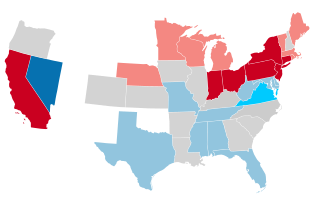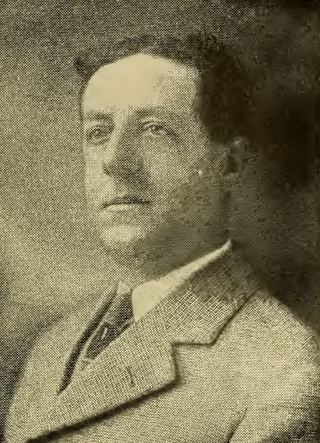
The 1954 United States Senate elections was a midterm election in the first term of Dwight D. Eisenhower's presidency. The 32 Senate seats of Class 2 were contested in regular elections, and six special elections were held to fill vacancies. Eisenhower's Republican party lost a net of two seats to the Democratic opposition. This small change was just enough to give Democrats control of the chamber with the help of the Independent who at the start of this Congress in January 1955 agreed to caucus with them; he later officially joined the party in April 1955.
The Massachusetts Democratic Party (MassDems) is the affiliate of the Democratic Party in Massachusetts. It is chaired by Steve Kerrigan and is the dominant party in the state, controlling all nine of the state's U.S. House seats, both U.S. Senate seats, all six elected statewide offices including the governorship, and supermajorities in both houses of the state legislature.
The following table indicates the party of elected officials in Massachusetts:
The 1911 United States Senate election in New York was held from January 17 to March 31, 1911, by the New York State Legislature to elect a U.S. Senator to represent the State of New York in the United States Senate.

Newland Howard Holmes was a Massachusetts politician who served as President of the Massachusetts Senate from 1957 to 1958. As of 2022, he is the last Republican to hold this position.

The 1978 Massachusetts gubernatorial election was held on November 7, 1978. Former Massachusetts Port Authority executive director Edward J. King was elected to a four-year term, from January 4, 1979, until January 6, 1983. King won the Democratic nomination by defeating incumbent governor of Massachusetts Michael Dukakis in the Democratic primary.

The 1898–99 United States Senate elections were held on various dates in various states. As these U.S. Senate elections were prior to the ratification of the Seventeenth Amendment in 1913, senators were chosen by state legislatures. Senators were elected over a wide range of time throughout 1898 and 1899, and a seat may have been filled months late or remained vacant due to legislative deadlock. In these elections, terms were up for the senators in Class 1.

The 1880–81 United States Senate elections were held on various dates in various states, coinciding with the presidential election of 1880. As these U.S. Senate elections were prior to the ratification of the Seventeenth Amendment in 1913, senators were chosen by state legislatures. Senators were elected over a wide range of time throughout 1880 and 1881, and a seat may have been filled months late or remained vacant due to legislative deadlock. In these elections, terms were up for the senators in Class 1.

The 1884–85 United States Senate elections were held on various dates in various states, coinciding with the presidential election of 1884. As these U.S. Senate elections were prior to the ratification of the Seventeenth Amendment in 1913, senators were chosen by state legislatures. Senators were elected over a wide range of time throughout 1884 and 1885, and a seat may have been filled months late or remained vacant due to legislative deadlock. In these elections, terms were up for the senators in Class 3.

The 1886–87 United States Senate elections were held on various dates in various states. As these U.S. Senate elections were prior to the ratification of the Seventeenth Amendment in 1913, senators were chosen by state legislatures. Senators were elected over a wide range of time throughout 1886 and 1887, and a seat may have been filled months late or remained vacant due to legislative deadlock. In these elections, terms were up for the senators in Class 1.

The 1964 Massachusetts gubernatorial election was held on November 3, 1964. Incumbent Governor Endicott Peabody ran for re-election, but was defeated by then-Lieutenant Governor Francis X. Bellotti in the Democratic Party primary. Bellotti went on to lose the general election to former Governor John Volpe.

The 1960 Massachusetts gubernatorial election was held on November 8, 1960. John A. Volpe was elected Governor of Massachusetts to replace Foster Furcolo. Volpe defeated Democrat Joseph D. Ward in the race. Also running were Henning A. Blomen of the Socialist Labor Party of America and Guy S. Williams of the Prohibition Party.
The 1887 United States Senate election in Massachusetts was held during January 1887. Republican incumbent Henry L. Dawes was re-elected to a third term over opposition from within his own party, led by former Governor John Davis Long.
The 1877 United States Senate election in Massachusetts was held in January 1877. Incumbent Republican Senator George S. Boutwell, who had won a special election for the remainder of Henry Wilson's term, was defeated by reformist U.S. Representative George Frisbie Hoar.
The 1883 United States Senate election in Massachusetts was held in January 1883. Incumbent Republican Senator George Frisbie Hoar was re-elected to a second term in office despite a serious challenge from Democrats and members of his own party.
The 1889 United States Senate election in Massachusetts was held in January 1889. Incumbent Republican Senator George Frisbie Hoar was re-elected to a third term in office with no serious opposition.
The 1901 United States Senate election in Massachusetts was held in January 1901. Incumbent Republican Senator George Frisbie Hoar was re-elected to a fifth term in office.

Boyd Richey Overhulse was an American politician and attorney from Oregon. He served three terms in the Oregon House of Representatives followed by two terms in the Oregon State Senate. A conservative Democrat from a rural district, Overhulse was known for his ability to work with Republicans as well as fellow Democrats in the state legislature. He was elected President of the Oregon Senate eleven days after taking his seat in the state senate, the first Democrat elected to that position in 79 years.

The 2018 Massachusetts general election was held on November 6, 2018, throughout Massachusetts. Primary elections took place on September 4. Early voting took place from October 22 through November 2.

James G. Moran was an American politician who served as President of the Massachusetts Senate from 1935 to 1936.












